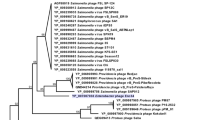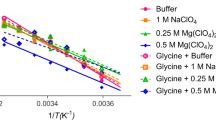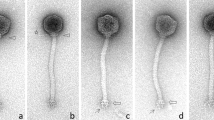Abstract
As part of the programme in this Laboratory of studying the relation between a bacteriophage and its host organism, analyses have been made of the amino-acid contents of hydrochloric acid and barium hydroxide digests of E. coli. The methods used for this have been the partition chromatography of Consdon, Gordon and Martin1 as modified2 to yield quantitative results. The following known amino-acids have been identified in these hydrolysates : aspartic and glut-amic acids, serine, glycine, alanine, threonine, valine, isoleucine, leucine, methionine, tryptophane, phenylalanine, tyrosine, proline, arginine, lysine and histidine. In addition, three weak spots, indicated by the letters a, b, c in Fig. 1, have been noticed which do not correspond to known naturally occurring amino-acids. Spots b and c have only been visible when concentrated hydrolysates containing c. 40 mgm. N/c.c. have been applied to the paper.
This is a preview of subscription content, access via your institution
Access options
Subscribe to this journal
Receive 51 print issues and online access
$199.00 per year
only $3.90 per issue
Buy this article
- Purchase on Springer Link
- Instant access to full article PDF
Prices may be subject to local taxes which are calculated during checkout
Similar content being viewed by others
References
Consdon, R., Gordon, A. H., and Martin, A. J. P., Biochem. J., 38, 224 (1944).
Polson, A., Mosley, V. M., and Wyckoff, R. W. G., Science, 105, 603 (1947).
Schützenberger, P., and Bourgeois, A., C.R. Acad. Sci., Paris, 81, 1191 (1875).
Fischer, E., and Skita, A., Z. physiol. Chem., 33, 177 (1901).
Foreman, F. W., Biochem. Z., 56, 1 (1913).
Fischer, E., and Mouneyrat, A., Ber. deut. chem. Ges., 33, 2383 (1900).
Dent, C. E., Science, 105, 335 (1947).
Author information
Authors and Affiliations
Rights and permissions
About this article
Cite this article
POLSON, A. New Amino-Acids in Bacterial Hydrolysates. Nature 161, 351–352 (1948). https://doi.org/10.1038/161351a0
Issue Date:
DOI: https://doi.org/10.1038/161351a0
This article is cited by
-
L(+) ?-Amino-n-butters�ure als Baustein der Eiwei�stoffe der Samen von Salvia officinalis L.
Die Naturwissenschaften (1964)
-
Freie und Hydrolysat-Aminos�uren in vegetativen Zellen und Sporen von Bacillus subtilis
Archiv f�r Mikrobiologie (1957)
-
Partition Chromatography on Paper, Its Scope and Application
Nature (1948)
-
Chromatographical Study of Meristematic Plant Tissues
Nature (1948)
Comments
By submitting a comment you agree to abide by our Terms and Community Guidelines. If you find something abusive or that does not comply with our terms or guidelines please flag it as inappropriate.



